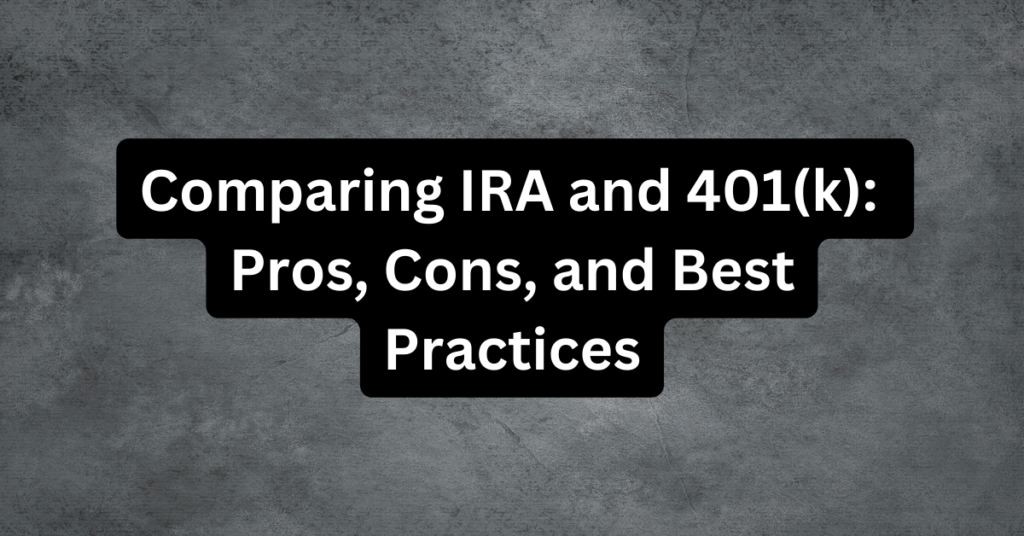When it comes to planning for retirement, the choice between an Individual Retirement Account (IRA) and a 401(k) can be pivotal. These retirement accounts offer distinct advantages and drawbacks, making it essential to understand their pros, cons, and best practices. In this comprehensive comparison, we’ll explore the key features of both accounts to help you make an informed decision for your retirement savings.

The IRA Advantage:
Pros:
1. Versatility:
– Traditional IRAs: Offer tax-deductible contributions, reducing your taxable income for the year.
– Roth IRAs: Provide tax-free withdrawals in retirement, potentially saving you a substantial amount in taxes.
2. Investment Control:
– IRAs typically offer a broader range of investment options, allowing you to tailor your portfolio to your specific goals and risk tolerance.
3. Accessibility:
– IRAs are self-directed and accessible to anyone with earned income, regardless of employer participation.
4. No Required Employer Sponsorship:
– You can open an IRA independently, making it a viable option for self-employed individuals and those without access to a 401(k) through their employer.
Cons:
1. Contribution Limits:
– IRAs have lower contribution limits compared to 401(k) plans, potentially limiting the amount you can save for retirement.
2. No Employer Match:
– IRAs do not offer employer matching contributions, meaning you won’t receive additional funds from your employer for retirement savings.
Make Informed Choices for Your Retirement!
Discover the Best Practices for Your Retirement Savings. Subscribe to Our Free Retirement Planning Newsletter for Bonus Podcasts and Valuable Community Insights!
The 401(k) Advantage:
Pros:
1. Higher Contribution Limits:
– 401(k) plans allow for significantly higher annual contributions, making them ideal for individuals looking to maximize retirement savings.
2. Employer Matching:
– Many employers offer matching contributions to 401(k) plans, effectively providing “free money” for your retirement.
3. Automatic Payroll Deductions:
– Contributions to a 401(k) are often made through automatic payroll deductions, promoting consistent savings habits.
4. Access to Loans:
– Some 401(k) plans allow participants to take loans from their accounts in case of financial emergencies.
Cons:
1. Limited Investment Options:
– 401(k) plans typically offer a limited selection of investment choices, which may restrict your ability to diversify your portfolio.
2. Employer Dependence:
– You can only access a 401(k) plan if your employer offers it, leaving you dependent on your employer’s retirement benefits.
Best Practices:
1. Maximize Employer Match:
– If your employer offers a 401(k) match, aim to contribute enough to receive the full match—this is essentially free money for your retirement.
2. Diversify Your Investments:
– Whether you choose an IRA or a 401(k), diversify your portfolio to spread risk and optimize returns.
3. Consider Both:
– Depending on your circumstances, you can contribute to both an IRA and a 401(k) to take advantage of their unique benefits.
4. Review and Adjust:
– Regularly review your retirement accounts and adjust your contributions and investments as your financial situation and goals evolve.
In conclusion, the choice between an IRA and a 401(k) should align with your specific financial situation and retirement goals. Both accounts offer valuable benefits, and you may even choose to utilize both for a well-rounded retirement savings strategy. To make the best decision, consult with a financial advisor who can provide personalized guidance tailored to your needs.
Secure Your Financial Future Today!
Delve into the Pros, Cons, and Best Practices of IRA vs. 401(k). Subscribe Today and Gain Access to Expert Insights, Bonus Podcast Episodes, and Exclusive Community Perspectives!
Disclaimer: This article provides general information about IRAs and 401(k) plans and is not intended as financial advice. Please consult a financial advisor for personalized guidance.
Pingback: Retirement Account Showdown: IRA vs. 401(k) Explained😘